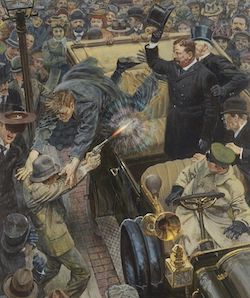At a Glance
Topics
Features
Duration
Grade(s)
Lesson Format
Download
Theodore Roosevelt and the 1912 Election
Students learn about Theodore Roosevelt the man and his 1912 third party campaign for president.
Review

In this teaching module from the Shapell Manuscript Foundation in collaboration with the Roy Rosenzweig Center for History and New Mediastudents learn how to examine engaging primary sources that surround the dramatic 1912 presidential campaign in which Roosevelt ran as a third party candidate after having served as president from 1901 to 1909. During the campaign Roosevelt was the victim of an assassination attempt while speaking in Milwaukee and several of the documents relate to this event and how it affected Roosevelt and the campaign.
Students work in small groups to analyze sources to better understand Theodore Roosevelt, the person, and the issues that most concerned Americans during the 1912 campaign. Primary sources include letters from Roosevelt providing an account of his assassination and an update on his recovery. Other sources relate to the campaign itself and the Bull Moose or Progressive Party that Roosevelt ran under. Students are also encouraged to think through how Roosevelt's personality made him an attractive candidate.
After analyzing these primary sources students work in groups to create their own campaign materials for Roosevelt. Teachers have the option of having students create physical posters or pamphlets or to have students use digital tools to create their promotional materials. The modules also contain guidance on differentiation for diverse learners and connections to standards.
Notes
| Field | Criteria | Comments | ||
|---|---|---|---|---|
| Historical Content | Is historically accurate? | Yes |
||
| Includes historical background? | Yes |
|||
| Requires students to read and write? | Yes |
|||
| Analytic Thinking | Requires students to analyze or construct interpretations using evidence? | Yes |
||
| Requires close reading and attention to source information? | Yes |
|||
| Scaffolding | Is appropriate for stated audience? | Yes |
||
| Includes materials and strategies for scaffolding and supporting student thinking? | Yes |
|||
| Lesson Structure | Includes assessment criteria and strategies that focus on historical understanding? | Yes |
||
| Defines clear learning goals and progresses logically? | Yes |
|||
| Includes clear directions and is realistic in normal classroom settings? | Yes |
|||